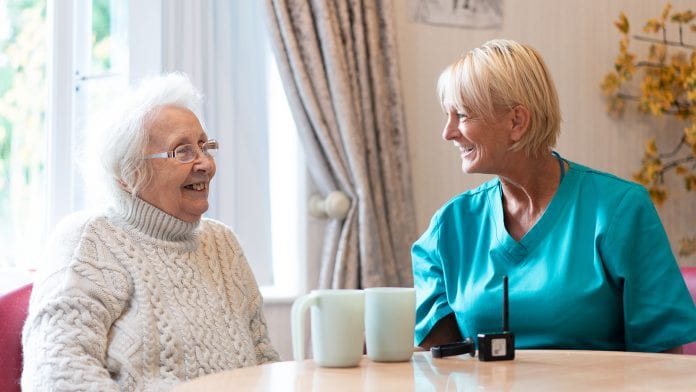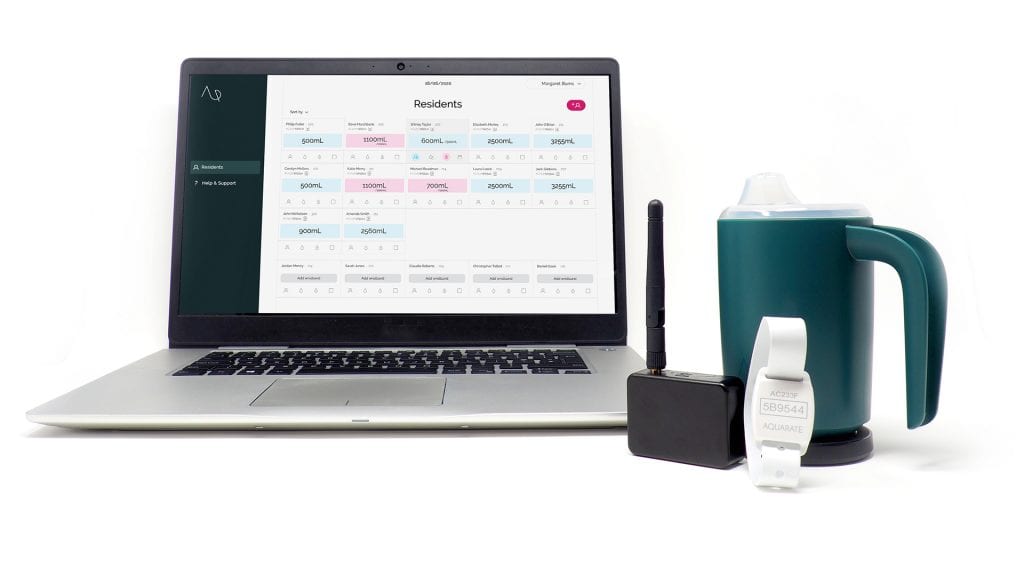
Aquarate Hydracare Technology smart IOT devices can prevent medical emergencies related to dehydration in health and social care patients
Hydration is a key aspect of elderly care. It can become more difficult to stay hydrated as we age, as our bodies retain less water and the signs of dehydration are also often milder, meaning we may not feel thirsty until we are already significantly dehydrated.
Fluid is so important to our overall health that even when levels drop only slightly, we begin to feel the consequences. Low levels of fluid in the body can cause headaches, feelings of dizziness, lethargy, poor concentration and a dry mouth. Severe dehydration can cause urinary tract infections, acute kidney injury, falls and hospital readmissions. Older people are particularly vulnerable to developing dehydration due to physiological changes associated with ageing. These include deterioration in kidney function, the loss of a keen sense of thirst and a reduction in muscle mass, where most water in the body is stored. Additional factors including a decline in physical state (for example arthritis, poor mobility or loss of sight), cognitive impairment and swallowing difficulties may also influence the ability of older people to consume and retain fluids.
Over 40,000 avoidable hydration-related deaths occur in the UK annually, creating unnecessary pressure on our healthcare system. Dehydration is a predictable and avoidable emergency diagnosis that should never occur, but in the UK alone, disease-related malnutrition and dehydration cost the NHS more than £13bn per year.
Regular and adequate intakes of fluid can help to address the preventable illnesses and death and reduce the cost burden across our care system. However, inaccurate manual fluid charts have been used year after year within the care sector, despite being widely known as an ineffective tool. As the healthcare market continues to battle to keep up with the increasing demand and new pressures from COVID-19, remote fluid intake monitoring has never been needed more.
Dehydration in health and social care patients and COVID-19
The coronavirus pandemic has taken a grim toll on social care services in England. By 19 June 2020, there had been more than 30,500 excess deaths among care home residents in England. Our social care system is underfunded, understaffed, undervalued and at risk of collapse. With COVID-19 taking high priority over the last 12 months, it is more important than ever that remote and accurate monitoring of residents can be put in place to ensure proactive monitoring to prevent further deterioration and enable swift medical response.
Patients infected with COVID-19 are likely to become feverish, meaning that there is a significant risk of becoming dehydrated. People need to drink more fluids and should be urinating approximately every six hours.
COVID-19 can present a variety of symptoms, but one potentially dangerous symptom most people aren’t particularly excited to talk about is diarrhoea: an estimated 20% of COVID-19 patients are likely to experience diarrhoea soon after contracting the disease. People with compromised immune systems, such as those recovering from COVID-19, are at the greatest risk of developing diarrhoea and other gastrointestinal symptoms, including vomiting and nausea.
When someone is experiencing diarrhoea, their bodies are no longer maintaining the important balance of water and sodium, often leading to dehydration. This dehydration, coupled with COVID-19, can affect the function of a person’s lungs, which can result in pneumonia. In severe cases, diarrhoea can affect a person’s kidney and liver function, mental state, heart rate and breathing. It can also lead to a full-body infection known as sepsis; and, in some circumstances, can lead to death.
Solution: Aquarate Hydracare and the Hydracup
Hydracare technology ensures accurate, automated fluid monitoring to increase hydration and reduce incidences of dehydration in health and social care patients.
Hydracare is the only smart cup on the market which can produce accurate data that integrates into care systems, saving staff time, and delivering quality care. The Hydracup tracks an individual’s fluid intake over the course of the day, allowing care staff to proactively support further fluids to those who need it the most.
Hydracare has been designed for domiciliary care and care homes to save nursing time and reduce avoidable hospital readmissions. “Living with various medical conditions, it’s really important to make sure I drink plenty of water to keep hydrated,” says 90-year-old Jessie Fraser. “The Hydracup is a great solution: it is easy to drink from, feels comfortable to hold and lets me know exactly how much liquid I’ve consumed each day. A really great product!”
A renal nurse at Elderholme Nursing Home adds: “No matter how much you watch the residents drinking, it’s really difficult to know how much they have actually had. Aquarate is easy to use and shows when residents are not drinking enough.”

Benefits of Hydracare
The Hydracup provides:
- Accurate real time fluid data;
- Enables proactive monitoring;
- Increases hydration levels across organisations;
- Reduces nursing time for monitoring and recording;
- Increases quality of care;
- Reduces patient safety issues;
- Reduces avoidable deterioration and preventable hospital readmissions; and
- Supports independent living for longer.
Use cases
Product evaluations of the smart cup have been conducted in partnership with Royal Liverpool University Hospital (RLUH), Elderholme Nursing Home, and Redholme Memory Care in the UK to test our product with a range of patients, nursing staff and care providers. Dr Mike Fisher PhD, Consultant Interventional Cardiologist and CCIO at RLUH, comments: “The Royal Liverpool Hospital is proud to be working with Aquarate as part of its Global Digital Exemplar programme. We are using 21st century technology to solve a very old patient safety problem, employing sensor enabled devices to monitor a patient’s fluid balance to improve the quality and safety of their care.”
Your opportunity
Aquarate Hydracare is currently being used by a growing number of care providers across the UK. We would love to hear from you to see how we can support you with managing dehydration in health and social care patients.
Rebecca Taylor
Founder & CEO
Aquarate
+44 (0) 7401 690 066
rebecca@aquarate.com
www.aquarate.com
This article is from issue 16 of Health Europa. Click here to get your free subscription today.







